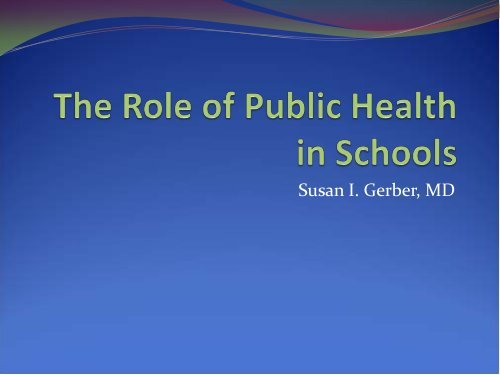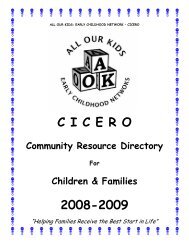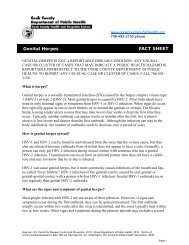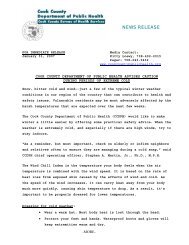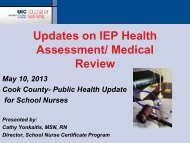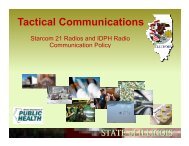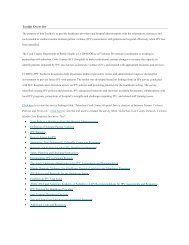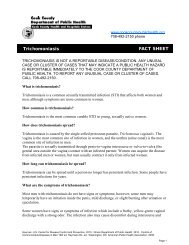Susan I. Gerber, MD - Cook County Department of Public Health
Susan I. Gerber, MD - Cook County Department of Public Health
Susan I. Gerber, MD - Cook County Department of Public Health
Create successful ePaper yourself
Turn your PDF publications into a flip-book with our unique Google optimized e-Paper software.
<strong>Susan</strong> I. <strong>Gerber</strong>, <strong>MD</strong>
Local <strong>Public</strong> <strong>Health</strong> <strong>Department</strong><br />
• Communicable diseases<br />
• Environmental health<br />
• Chronic diseases<br />
• Emergency preparedness<br />
• Special programs
<strong>Public</strong> <strong>Health</strong> Reporting<br />
Ground Zero<br />
• Local government<br />
• City, county, municipality<br />
Regional<br />
Management<br />
• State<br />
• Managing local health department interactions<br />
National<br />
Coordination and<br />
Policy<br />
• Federal<br />
• Centers for Disease Control and Prevention
Control <strong>of</strong> Communicable Diseases<br />
• Considered to be infectious, communicable, and<br />
dangerous to the health <strong>of</strong> the public<br />
• Need to be reported to the local health department<br />
• The state <strong>of</strong> Illinois publishes Rules & Regulations for<br />
communicable diseases
Ground Zero: Disease Control<br />
• Local public health receives disease reports from<br />
mandated reporters:<br />
• Physicians<br />
• Nurses<br />
• Hospitals<br />
• Laboratories<br />
• Long term care facilities<br />
• Schools or any entity with knowledge <strong>of</strong> a<br />
communicable disease
Classes <strong>of</strong> Diseases<br />
•Class 1<br />
•Report to the local health<br />
department as soon as possible, but<br />
within 24 hours<br />
•Class 2<br />
•Report to the local health<br />
department as soon as possible , but<br />
within 7 days
Class I Diseases<br />
Any unusual case or cluster <strong>of</strong> cases that<br />
may present a public health hazard<br />
• Anthrax<br />
• Cholera<br />
• Diptheria<br />
• Foodborne or<br />
waterborne illness<br />
• Hepatitis A<br />
• Measles<br />
• Pertussis<br />
• Meningitis and other<br />
invasive disease<br />
(N.meningitidis, H.<br />
influenzae)<br />
• Plague<br />
• Rabies, human<br />
• Smallpox<br />
• Typhoid
Class II Diseases<br />
• Blastomycosis<br />
• Cryptosporidiosis<br />
• Giardiasis<br />
• Hepatitis B<br />
• Hepatitis C<br />
• Legionella<br />
• Leptospirosis<br />
• Listeria<br />
• Salmonella<br />
• Shigella<br />
• Tickborne disease<br />
• Non-cholera vibrio<br />
• Yersinia
Communicable Disease<br />
Investigations<br />
• Cases are reported by infection control personnel and<br />
microbiology laboratories<br />
• Cases are assigned to communicable disease<br />
investigators<br />
• Information pertaining to individual cases and<br />
sometimes contacts is obtained depending on the<br />
particular disease
Enteric Investigations<br />
• Includes diseases such as Salmonella, Shigella, E. coli<br />
• These organisms can be spread person to person or<br />
can infect food<br />
• Can cause diarrhea, vomiting, fever, and abdominal<br />
pain<br />
• Most effective way to prevent these diseases is<br />
handwashing
Enteric Investigations<br />
•Investigate factors pertaining to spread<br />
<strong>of</strong> disease<br />
•Restrict food handlers or personnel in<br />
sensitive occupations when necessary<br />
•Surveillance activities<br />
•Identification <strong>of</strong> foodborne disease<br />
outbreaks
Facts about Foodborne Illness<br />
• Symptoms generally last for at least several hours to<br />
several days<br />
• Bacterial toxins, bacteria, and viruses have incubation<br />
periods that can range from approximately 1 hour to<br />
several days.<br />
• <strong>Public</strong> health determines whether a group <strong>of</strong> illnesses<br />
can be considered a foodborne disease outbreak
Determining Whether or Not<br />
Illnesses are Part <strong>of</strong> a Foodborne<br />
Disease Outbreak<br />
• The diagnosis <strong>of</strong> foodborne disease should be<br />
considered when 2 or more persons who have a<br />
shared meal develop an acute illness characterized<br />
by nausea, vomiting, diarrhea, and occasionally<br />
other symptoms.
Diagnosing a Foodborne Disease<br />
Outbreak<br />
• Must determine what causative agent makes sense<br />
using:<br />
• information about clinical syndrome<br />
• incubation period<br />
• Commonly associated foods with specific organisms
How are Foodborne Diseases<br />
Diagnosed<br />
• Most <strong>of</strong>ten, the key to identifying what organism is<br />
causing the illness is through:<br />
STOOL SPECIMENS
Causes <strong>of</strong> Persistent Vomiting in a<br />
School- Age Child<br />
• Enteric viruses which are passed from child to child<br />
• Viruses and bacteria from food<br />
• Trauma to the abdomen<br />
• Urinary infections<br />
• Food intolerance<br />
• Migraine headaches and neurologic diseases<br />
• Psychogenic<br />
• Medications and drugs<br />
• Toxins (eg. Lead)<br />
• Metabolic diseases<br />
• Peptic ulcer disease<br />
• Appendicitis<br />
• Pregnancy
What is Meningitis<br />
• Infection <strong>of</strong> the fluid around the spinal cord and the<br />
fluid that surrounds the brain<br />
• Could be caused by a virus or a bacteria<br />
• Symptoms:<br />
• High fever<br />
• Headache<br />
• Stiff neck<br />
• Unable to look at bright lights
Viral Meningitis<br />
• Less severe<br />
• People get better quickly<br />
• Can be caused by lots <strong>of</strong> viruses:<br />
• Summer viruses are common (enteroviruses)<br />
• West Nile Virus<br />
• Sometimes viruses that only cause colds can cause mild<br />
meningitis
Enteroviruses:<br />
The Viruses <strong>of</strong> Summer<br />
• Summer viral meningitis<br />
• Commonly occurs in late summer and early fall<br />
• Lots <strong>of</strong> different kinds<br />
• Commonly seen in children<br />
• Illness improves within a few days<br />
• Doctor might call this viral meningitis
Bacterial Meningitis<br />
• Usually more severe<br />
• Less common than viral meningitis<br />
• New vaccines have decreased the number <strong>of</strong> children<br />
who get bacterial meningitis<br />
• Examples <strong>of</strong> bacteria that cause meningitis:<br />
• Pneumococcus (Streptococcus pneumoniae)<br />
• Meningococcus (Neisseria meningitidis)<br />
• Haemophilus influenzae
A Source <strong>of</strong> Confusion<br />
•Meningitis ≠<br />
Meningococcus<br />
•Meningitis just refers to some type<br />
<strong>of</strong> infection <strong>of</strong> the spinal fluid<br />
•Meningococcus is a type <strong>of</strong> bacteria<br />
that can cause both meningitis AND<br />
bloodstream infections
Meningococcus<br />
• The bacteria is called Neisseria meningitidis<br />
• Severe type <strong>of</strong> meningitis, but also causes an infection<br />
in the blood<br />
• 5-10% <strong>of</strong> people carry this bacteria in their noses<br />
without ever getting ill<br />
• Can be spread in a household or by secretions<br />
(sneezing and coughing directly onto someone else)
Meningococcus<br />
• Can be treated with antibiotics<br />
• Rarely causes outbreaks<br />
• Two different types <strong>of</strong> vaccines are available to prevent<br />
some types <strong>of</strong> this disease<br />
• Close contacts to cases are recommended to receive<br />
antibiotics as a precaution
All Meningitis:<br />
Viral and Bacterial<br />
• Can be diagnosed by a healthcare provider<br />
• If symptoms <strong>of</strong> high fever, headache, and stiff neckshould<br />
see a doctor IMMEDIATELY<br />
• Diagnosis is made by lumbar puncture and<br />
examination <strong>of</strong> spinal fluid<br />
• Only by looking at spinal fluid can a person<br />
conclusively tell if there is meningitis
Reducing Spread <strong>of</strong> Any Type <strong>of</strong> Meningitis<br />
• Just like reducing the chance <strong>of</strong> any bacterial or viral<br />
disease:<br />
• Good handwashing with soap and water!<br />
• Using alcohol based sanitizers also works!<br />
• People covering their mouth and nose when sneezing<br />
and coughing
Questions<br />
• <strong>Cook</strong> <strong>County</strong> <strong>Department</strong> <strong>of</strong> <strong>Public</strong> <strong>Health</strong>:<br />
• 708-633-8030<br />
• www.cookcountypublichealth.org


